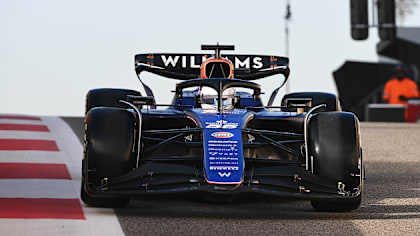
News
Formula 1 announces plan to be Net Zero Carbon by 2030
Share

Formula 1 has today announced an ambitious sustainability plan to have a net-zero carbon footprint by 2030.
This initiative will cover the Formula 1 cars and on-track activity and the rest of the operations as a sport.
The plan comes after twelve months of intense work with the FIA, sustainability experts, Formula 1 teams, promoters, and partners, resulting in an ambitious, yet achievable delivery plan.
Carbon reduction projects will begin immediately to start the journey of becoming a more sustainable sport.
READ MORE: How F1 technology has supercharged the world
Formula 1 has been at the forefront of technological innovation throughout its history with advancements that have directly benefitted the wider automotive industry. Aerodynamic innovations, safety developments, energy recovery systems, navigation tools and composite materials from F1 have been adopted by the road car and other industries.
In launching F1’s first-ever sustainability strategy, we recognise the critical role that all organisations must play in tackling this global issue
Chase Carey, Chairman and CEO, Formula 1
Being at the forefront of automotive innovation gives Formula 1 a global platform to accelerate progress and develop technologies that reduce and eliminate carbon emissions from the current internal combustion engine (ICE). The hybrid power unit will play a key role in the future of the automotive industry.
The current F1 hybrid power unit, delivering more power using less fuel than any other car, combined with advanced sustainable fuels and energy recovery systems presents a tremendous opportunity to deliver a net-zero carbon hybrid power unit. With over 1 billion of the 1.1 billion vehicles in the world powered by ICEs, it has the potential to reduce carbon emissions globally.
In addition to the plans to eliminate the carbon footprint of the F1 car and the on-track activities, initiatives will include action to ensure F1 moves to ultra-efficient logistics and travel and 100% renewably powered offices, facilities and factories.
F1's commitment to sustainability
By 2025 F1 will also ensure all events are sustainable. This will mean the use of sustainable materials at all events with single-use plastics being eliminated and all waste reused, recycled or composted. Additionally, F1 will provide incentives and tools to offer every fan a greener way to reach the race and ensure circuits and facilities enhance fan wellbeing and nature as well as providing opportunities for local people, businesses and causes to get more involved in the action during a Formula 1 race weekend.
Delivering the plan will involve F1 working with the FIA and all of its partners, promoters, sponsors and the teams and building on the work that many of them are already delivering on the sustainability issue.
The plan will be set out in detail on the Formula 1 corporate website.
The FIA welcomes this Formula 1 initiative. It is not only very encouraging for the future of motorsport, but it could also have strong benefits for society as a whole.
Jean Todt, President of the FIA

Chase Carey, Chairman, and CEO of Formula 1, said:
“Over its 70-year history, F1 has pioneered numerous technologies and innovations that have positively contributed to society and helped to combat carbon emissions. From ground-breaking aerodynamics to improved brake designs, the progress led by F1 teams has benefitted hundreds of millions of cars on the road today.
"Few people know that the current F1 hybrid power unit is the most efficient in the world, delivering more power using less fuel, and hence CO2, than any other car. We believe F1 can continue to be a leader for the auto industry and work with the energy and automotive sector to deliver the world’s first net zero carbon hybrid internal combustion engine that hugely reduces carbon emissions around the world.
“In launching F1’s first-ever sustainability strategy, we recognise the critical role that all organisations must play in tackling this global issue. By leveraging the immense talent, passion and drive for innovation held by all members of the F1 community, we hope to make a significant positive impact on the environment and communities in which we operate. The actions we are putting in place from today will reduce our carbon footprint and ensure we are net zero carbon by 2030.”
Jean Todt, President of the Federation Internationale de l'Automobile (FIA) said:
“Our commitment to global environmental protection is crucial. The FIA welcomes this Formula 1 initiative. It is not only very encouraging for the future of motorsport, but it could also have strong benefits for society as a whole.
"This strategy is in line with initiatives started some years ago by the FIA with the creation of the Environmental Accreditation Programme, more recently with the FIA Environment and Sustainability Commission, and researches on renewable racing fuel. Furthermore, in 2014 we introduced the hybrid power unit in Formula 1, which was essential for the development of motorsport’s highest category.
"It is the same reason that led us to maintain this philosophy within the framework of the Formula 1 regulations applicable from 2021. With the involvement of the teams, drivers, F1’s numerous stakeholders, and crucially the millions of fans around the world, the FIA and Formula 1 are committed to driving development and ensuring motorsport grows as a laboratory for environmentally beneficial innovations.”
YOU MIGHT ALSO LIKE
Feature IN NUMBERS: The incredible statistics behind Verstappen's fourth consecutive title-winning season
FeatureF1 Unlocked HINCH'S HEROES: Who impressed IndyCar star James Hinchcliffe in the Abu Dhabi season finale?
Image Gallery GALLERY: Sainz at Williams, Ocon at Haas and more as drivers hit the track for Abu Dhabi post-season test
News Hamilton deserved to beat me in Abu Dhabi says Russell, as he pays tribute to ‘incredible’ team mate




